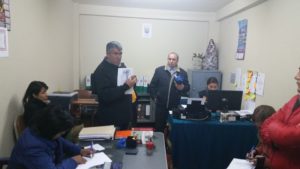Updated 11:34 p.m., Nov. 9
By John Dougherty
We’re now moving into the most dangerous phase of the presidential election.
Updated 11:34 p.m., Nov. 9
By John Dougherty
We’re now moving into the most dangerous phase of the presidential election.
A Peruvian Court has ruled that a security contract between Hudbay Minerals Inc. and police created a bias in favor of the Toronto-based mining company that resulted in the April 2017 illegal detention of InvestigativeMEDIA owner John Dougherty and international mining activist Jen Moore and a subsequent ban prohibiting them from entering the country.
“This decision provides further evidence of how the privatization of security forces in Peru undermines their impartiality and independence, and puts them at the service of companies like Hudbay Minerals creating a grave conflict of interest,” Moore states.
“This creates a highly permissible environment for human rights violations, including the criminalization and violent repression of people exercising their legitimate rights to protest mining projects and related harms,” she said. “Further, as this case demonstrates, it heightens state and company control over the information people have access to, such as through the criminalization of independent researchers and journalists.”
Hudbay is seeking permits to construct the third largest open-pit copper mine in the United States in the Santa Rita Mountains on the Coronado National Forest southeast of Tucson. The project has been stopped pending the outcome litigation in U.S. District Court.
Dougherty and Moore were surrounded by police and ordered into a vehicle after screening Dougherty’s documentary film “Flin Flon Flim Flam” at a downtown Cusco cultural center on April 17, 2017. The film detailed Hudbay’s history of environmental degradation and human rights abuses in Arizona, Canada, Guatemala and Peru.
Dougherty and Moore were held four hours by police who alleged they had violated their tourist visas.

Peru National Police officer Edgar Abarca Lezama holds documents during detention proceedings in Cucso, Peru against John Dougherty and Jen Moore.
Photo by John Dougherty
The next day, the Peruvian Interior Ministry issued a statement alleging Dougherty and Moore were inciting violence against mining operations in Peru. HudBay Minerals argued at the time that it had nothing to do with the criminalization of the two, although it admitted to contracting police for security services. Moore’s attorneys filed a habeus corpus motion in May 2017 and a Peruvian court issued its ruling earlier this month.
“In addition to recognizing that the police and Ministry of the Interior were partial to HudBay Minerals’ interests, the ruling finds that sharing information about the negative impacts of mining does not threaten public order nor does it violate migratory law, which were among the accusations made by police,” according to a statement issued earlier this week by Moore.
“On the contrary, the ruling finds that Moore was acting within her rights, and that this process of criminalization constitutes a violation of individual rights to freedom of expression and collective rights to access information.”
In a separate ruling earlier this year, a Peruvian court determined that the Interior Ministry violated Dougherty’s due process rights when it banned Dougherty and Moore from Peru for 10 years prior to even holding a hearing. The court ordered the travel ban lifted.
In the week prior to their detention, Dougherty and Moore were harassed and subject to police surveillance while they were visiting communities affected by HudBay’s Constancia copper mine in the province of Chumbivilcas where they screened the film and distributed DVD copies in Quechua. Police questioned local community leaders about their activities and sought their personal identification from a local hotel where they had stayed without them being present.
While contracts between Peruvian security forces and mining companies are legal, national and international organizations have vociferously opposed these arrangements given their detrimental impacts on the impartiality and independence of the police force, which is necessary to their role in ensuring justice, not facilitating criminalization, violating people’s rights and repressing Indigenous peoples and other mining-affected communities around the country, Moore states.
EarthRights International, the Peruvian Institute for Legal Defense and the National Coordinating Committee for Human Rights in Peru released a recent study in which they found that mining companies and other extractive firms have signed at least 138 contracts with police in Peru from 1995 to 2018.
There are numerous examples of where these privatized police arrangements occur with grave impacts, including where police response to community protests has led to criminalization or where repression has led to injury and death. In the case of Glencore’s Tintaya mine (formerly owned by XStrata), Peruvian citizens brought a civil lawsuit to UK court for violent police repression of Indigenous communities protesting environmental contamination and the company’s broken promises.
Moore notes in a first-person account in Foreign Policy in Focus that she and Dougherty “got off light” compared to the flagrant human rights abuses that have occurred as a result of mining companies having police security contracts.
“In an area not far from Cusco, police repression against Indigenous communities protesting environmental contamination in 2012 ended with dozens injured and two dead. And Peruvians often face much more punitive legal proceedings than we did.
“For instance, the governor of Puno province has been sentenced to six years in jail for allegedly organizing Aymara Indigenous communities to protest mining concessions for the Canadian company Bear Creek Mining in 2011, over very real concerns about the water contamination that results from gold mining.”
Chapter I, Chapter II, Chapter II supplement, Chapter III, Chapter IV, Chapter V, Chapter VI, Chapter VII, Chapter VIII , Chapter IX, Chapter X, Chapter XI, Chapter XII , Chapter XIII, Chapter XIV, Chapter XV, Chapter XVI, Chapter XVII, Chapter XVIII, Chapter XIX, Chapter XX, Chapter XXI, Chapter XXII, Chapter XXIII, Chapter XXIV, Chapter XXV, Chapter XXVI and Chapter XXVII, XXVIII, XXIX and XXX.